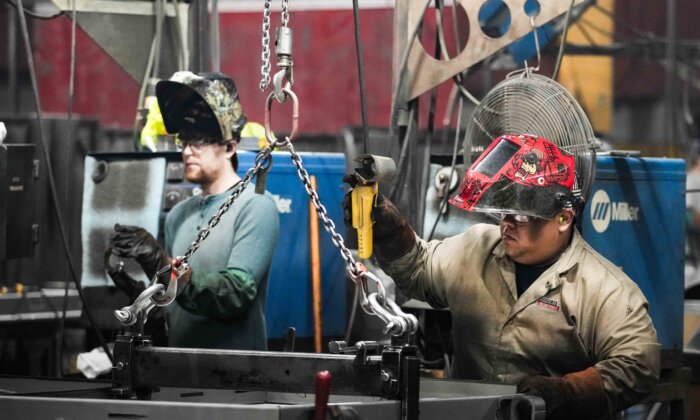


The U.S. economy grew faster in the 3rd quarter than previously expected but the numbers look more gloomy when looked at from the income side and, since then, economic data suggests that momentum has waned and growth is cooling.
Gross domestic product (GDP) rose at a 5.2 percent annualized rate last quarter, revised up from the previously reported 4.9 percent pace, the Commerce Department's Bureau of Economic Analysis (BEA) said in its second estimate of third-quarter GDP, released on Nov. 29.
The 5.2 pace of expansion was the fastest since the fourth quarter of 2021, with the acceleration in third-quarter GDP mostly due to an uptick in consumer spending and private inventory investment.
The upward revision (from 4.9 percent to 5.2 percent) was mostly due to positive adjustments to nonresidential fixed investment and state and local government spending, both of which were partly offset by a downward revision to consumer spending, per BEA.
In the second quarter, the U.S. economy grew at a 2.1 percent pace.
Some experts say that the latest GDP was mixed and likely exaggerated the health of the economy in the third quarter. That's partly because, when measured from the income side (real gross domestic income rose by just 1.5 percent), the U.S. economy grew at just a moderate pace.
Related Stories
"The numbers should match and do correlate over time," analyst Mike Shedlock wrote in a blog post, referring to the difference between GDP and gross domestic income (GDI). "But the difference between the measures is stunning."
"The discrepancy between GDP and GDI is ongoing and massive. That should bear attention," he added.
Some argued that the latest economic growth data suggests that the U.S. economy managed to pull off a quarter of relatively solid growth despite the persistence of recession fears.
"No sign of darkening skies for the economy in today's report, but growth is cooling," said Christopher Rupkey, chief economist at FWDBONDS in New York.
"There's simply not as much wind in the economy's sails in the final quarter this year," he added.
Market analyst Stephanie Pomboy took to X to note that the difference between GDP and GDI in the third quarter was the widest on record.
"Don't Believe the Hype," she wrote. "Widest gap between GDI and GDP in history."
In his analysis, Mr. Shedlock said that "the key take away from this release is the economy likely is not humming the way media and Biden present."
Economist Peter Schiff took to X to note that government spending contributed heavily to the strong GDP number in the third quarter.
"Without that spending, GDP would've contracted by .3%," he wrote. "Government spending borrowed money doesn't reflect real economic growth. It will only lead to higher inflation."
Inflation Fears Revived
American consumers have grown more pessimistic as inflation fears surged to a 22-year high, flashing a warning sign for the U.S. economy.The University of Michigan's closely watched consumer sentiment gauge fell by 4 percentage points in November to a reading of 61.3 percent.
The drop marks the fourth consecutive month of declines in the sentiment measure, with the deepening confidence slump coming as the twin geopolitical crises in Ukraine and Gaza show no sign of ending anytime soon.
Meanwhile, inflation expectations jumped for both the near- and long-term, reflecting consumer fears that the recent easing of price pressures would be short-lived.
U.S. consumers expect inflation to average 4.5 percent over the next 12 months and 3.2 in the next five years, per the University of Michigan survey. That's up from 4.2 percent and 3.0 percent, respectively, that consumers predicted when asked in October.
In particular, the five-year inflation expectation reading is the highest in 22 years.
"Consumers appear worried that the softening of inflation could reverse in the months and years ahead," Joanne Hsu, University of Michigan Surveys of Consumers director, said in a statement.
The jump in inflation expectations comes despite the fact that the Consumer Price Index (CPI), a measure of inflation, fell from 3.7 percent in September to 3.2 percent in October.
A separate measure of consumer confidence, issued by the Conference Board on Nov. 28, shows slight improvement in sentiment, with the gauge rising from 72.7 in October to 77.8 in November.
Still, any readings below 80 in the Conference Board measure historically signal a recession within the next year, so the improvement in sentiment is limited.
Wages Not Keeping Up With Inflation
Among employed Americans, 60 percent said their income has not kept up with increases in household expenses due to inflation over the past 12 months, according to a new survey from Bankrate. That's up from 55 percent last year.Meanwhile, less than one-third (29 percent) said their pay has kept up with or exceeded inflation this year compared to 33 percent last year, and 11 percent say they don’t know.
Nearly two-thirds of workers saw an increase in pay over the last 12 months (64 percent), including 48 percent who got a pay raise and 26 percent who got a better paying job, while 10 percent got both.
Among those who received a raise in the past year, 36 percent said their pay is keeping up with inflation (down from 39 percent last year), compared to 53 percent who said it is not (up from 50 percent last year).
“The job market has lost some of its steam since the Federal Reserve began raising interest rates to quell inflation, but not much,” Bankrate Analyst Sarah Foster told The Epoch Times in an emailed statement.
“The share of workers who got a raise in the past year is matching last year’s historic levels, and more Americans are getting raises today than they were before the pandemic. Even so, inflation remains painfully high for many households, eroding those gains," she continued.
"High inflation feels a bit like taking a pay cut in itself, and it might be one reason why Americans suggest the economy isn’t as strong as it looks on paper.”
Reuters contributed to this report.


